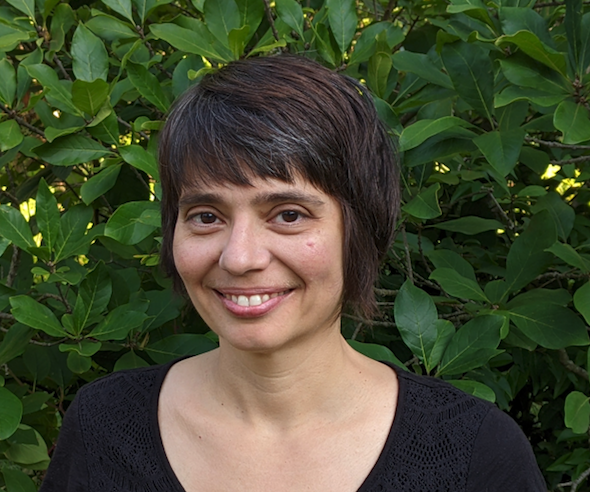Iglika Pavlova
Associate Professor

BS161 instructor, BS171 instructor, BS191H course coordinator, BioSci Fellows Progam coordinator
Starting with my first university teaching job, I was extremely fortunate to be able to combine my breadth of interests and knowledge to develop a variety of multidisciplinary courses to explore the Big Issues in our society such as infectious disease and food security. I love getting into the nitty-gritty details (e.g., how does this infectious agent work?) and applying them to multi-disciplinary solutions (e.g., preventing or treating infectious disease in the real world).
I also developed over the years as a STEM education scholar, which means that I get to be a natural scientist AND to take a psychology perspective to understand how people learn, what experiences they are having, and to develop approaches to enhance their belonging and learning. I have tried to consider my own challenges and opportunities to guide me to create a sense of belonging, purpose, and excitement for my students.
The best parts of my career have been collaborating with others and continuously learning – certainly lots of biology but also psychology, social justice, epistemology, and even how systems engineer thinking helps with decision-making. The learning also comes in the form of pushing boundaries to be a better human and better colleague. I am truly grateful to everyone who has helped me and worked with me. What is most important to me going forward is bringing in students as collaborators in educational scholarship and reform, for example as part of our budding BioSci Fellows Program.
I enjoy being in nature and hiking, as well as attending social and cultural events at MSU and beyond. I love when I can combine being in nature with learning and community engagement – I had a blast attending the Fresh Coast Film Festival on my first visit to the Upper Peninsula. I volunteer in the Beal Garden and the Allen Neighborhood Center.
Selected publications
Schmid KM, Avena J, Hobbie L, Kalas P, Kelly T, Klocko AL, Pavlova IV, Radick G, Snow LE, Smith MK. 2023. Honoring the Complexity of Genetics: Exploring the Role of Genes and the Environment Using Real World Examples. CourseSource 10. https://doi.org/10.24918/cs.2023.2
Basta H, Coleman S, Pavlova IV, Shah A. 2023. When tests disagree, how do I know if I have COVID-19? QUBES Educational Resources. https://doi.org/10.25334/JEB5-Y738 [As part of the ImmunoReach: Interdisciplinary Immunology Education Consortium]
Pavlova IV. 2022. Alien Intelligence Research Institute: a perspective-taking activity for a nuanced view on traits and a growth mindset. Journal of Microbiology & Biology Education, e00264-21 [In 2022 Themed Issue: Opportunities and Challenges of Online Instruction – Blurring the Lines between Online and On-site Teaching and Learning.]
Pavlova, IV, Remington, DL, Horton, M., Tomlin, E., Hens, MD, Chen, D., Willse, J. and Schug, MD. 2021. An introductory biology research-rich laboratory course shows improvements in students’ research skills, confidence, and attitudes. PLOS ONE, 16(12), p.e0261278. https://journals.plos.org/plosone/article?id=10.1371/journal.pone.0261278
Kreher SA, Pavlova IV, and Nelms A. 2021. An active learning intervention based on evaluating alternative hypotheses increases scientific literacy of controlled experiments in introductory biology. Journal of Microbiology & Biology Education 22(3): e00172-2
Pavlova IV. 2021. Student-driven design-and-improve modules to explore the effect of plant bioactive compounds in three model organisms. CourseSource. https://doi.org/10.24918/cs.2021.18
Pavlova IV, Kreher SA. 2013. Missing links in genes to traits: toward teaching for an integrated framework of genetics. American Biology Teacher 75 (9): 641
Selected presentations
Education & education research
Pavlova IV and Lewis KL. March 2021. Exploring the meanings of randomness and its links with causality in STEM classrooms. X-DBER (Discipline-Based Education Research) Interdisciplinary Conference.
Pavlova IV. July 2010. Improving understanding of science by teaching explicit principles of good reasoning in an evolution-themed course. ASM Conference for Undergraduate Educators (ASMcue), San Diego, CA
Pavlova IV, Horton ML, Badreddine Z. November 2019. Procedure vs. meaning: capturing lab GTAs interactions with students in video recordings. Biology Teaching Assistants Program (BioTAP) Annual meeting.
Mentored and collaborative undergraduate student presentations
Bond H and Niles T. May 2023. Discovering your environmental identity: From research to education for environmental action. Department of Biology, UNCG, Greensboro, NC. [BH and NT were undergraduate students at the time].
Bond H, Caldwell E, Eichhorn WN, Niles T, Pavlova IV. May 2023. Creating inclusive classrooms with student collaborators. 2023 UNCG ADAPT conference for undergraduate educators. 2023 Theme: Connectivity in education. [BH, CE, EWN, NT were undergraduate students at the time]
Swaim N and Pavlova IV. February 2022. An introductory biological diversity module lays the foundation for inclusion in the biology classroom. Project Kaleidoscope (PKAL) NC (virtual) [NS was an undergraduate student at the time]
Outreach
Pavlova IV. March 2023. Biological diversity and its implications in medicine. UNCG lecture to incoming science undergraduate students.
Clyburn J., LaBonte P, Pavlova IV. March 2017. Liver enzymes and personalized medicine. Presentation and hands-on laboratory experience. UNCG Science Everywhere festival. Greensboro, NC [JC and LBP were undergraduate students]
Pavlova IV and Lewis, KC. 2014. Bayes’ equation: From preventing panic in a doctor’s office to helping you think about scientific issues in your everyday life. STEM Speaker Series, Brookdale Community College, Lincroft, NJ.
Research methods workshops
Morelock J, Bolhari A, Chenette H, Chestnutt B, Dodson K, Hooshangi S, Jarvie-Eggart M, Pavlova I, Reck R, Wilson S. October 2023. Learn how to design high-quality qualitative educational research: A workshop for disciplinary STEM faculty by disciplinary STEM faculty. Workshop. Frontiers in Education (FIE) Annual Conference, College Station, TX
Pavlova IV. June 2023. The potential and challenges of Participatory Action Research (PAR) in college STEM education. Workshop. Chemistry Education Research group at UNCG, Greensboro, NC